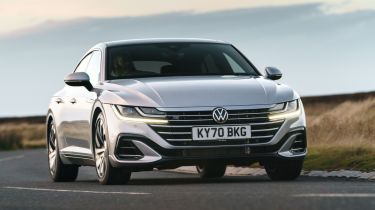Volkswagen Arteon (2017-2024) - Reliability and safety
Lots of technology makes the Arteon look like a very safe bet; but VW's Driver Power ranking disappoints

Just so you know, this is an older review of the 2017-2024 Volkswagen Arteon. If you are interested in information about a used Volkswagen Arteon, or news about the latest Volkswagen models, please follow the links provided.
It looks thoroughly contemporary from the outside, but there’s plenty of shared engineering under the skin of the Arteon, all of which shouldn’t provide too many headaches on the reliability front. The Arteon hasn’t appeared in our 2023 Driver Power satisfaction survey, but Volkswagen ranked 27th out of 32 brands in our 2023 best manufacturer rankings — which is far from impressive.
Aside from the shared MBQ platform, all of the Arteon’s engines are established in the Volkswagen Group line-up, and the same applies to technology such as the active Info dash and Discover Nav systems. Some of the more advanced electronics systems are a bit more novel, but many of them are related to safety systems seen elsewhere in the VW range, and we’d hope that the most rigorous test and development regimes have been applied.
On the safety front, the Arteon’s 2017 five-star rating has expired because the latest Euro NCAP testing criteria have gotten a lot tougher. That doesn’t mean the Arteon isn’t safe, because it comes with an array of standard-fit safety kit, such as Lane Departure Warning and Brake Assist, but there are newer alternatives like the Genesis G80 that have passed more stringent testing with flying colours that you might wish to consider if safety is your primary concern.
Warranty
The VW Arteon comes with Volkswagen’s standard three-year/60,000-mile warranty. This used to be standard fare, but BMW and Mercedes both offer three years of cover with unlimited mileage.
Servicing
Volkswagen offers fixed or flexible servicing packages for the Arteon, depending on mileage covered and type of driving undertaken. Oil changes service intervals are annual or after 9,300 miles if you go for the fixed option, while this is increased to every two years (18,600 miles) under the flexible option.







